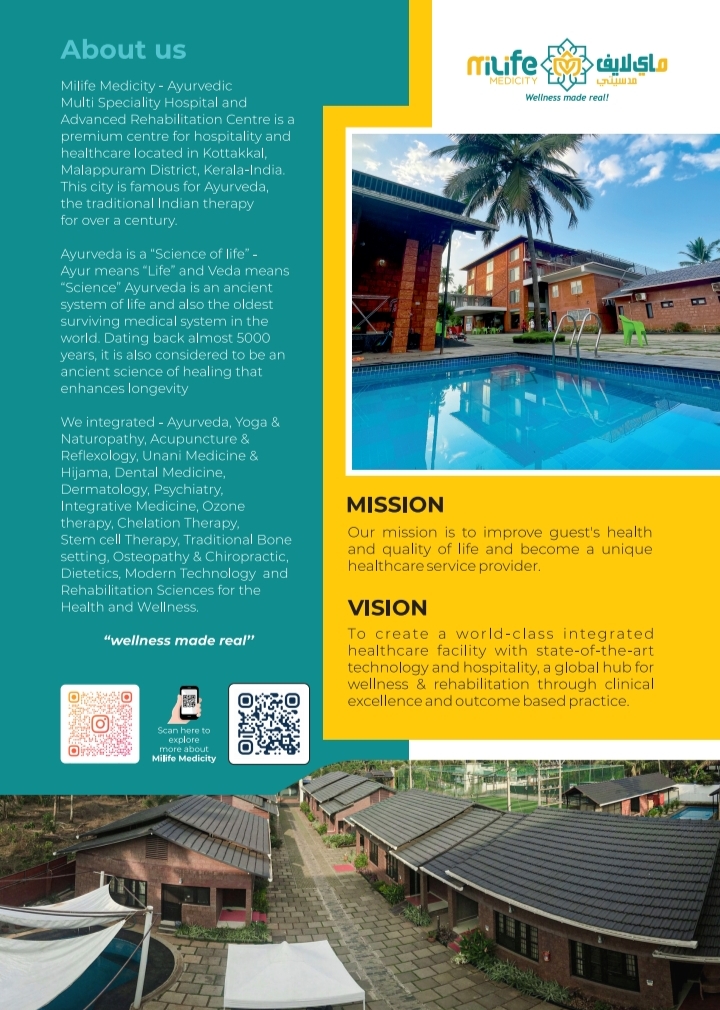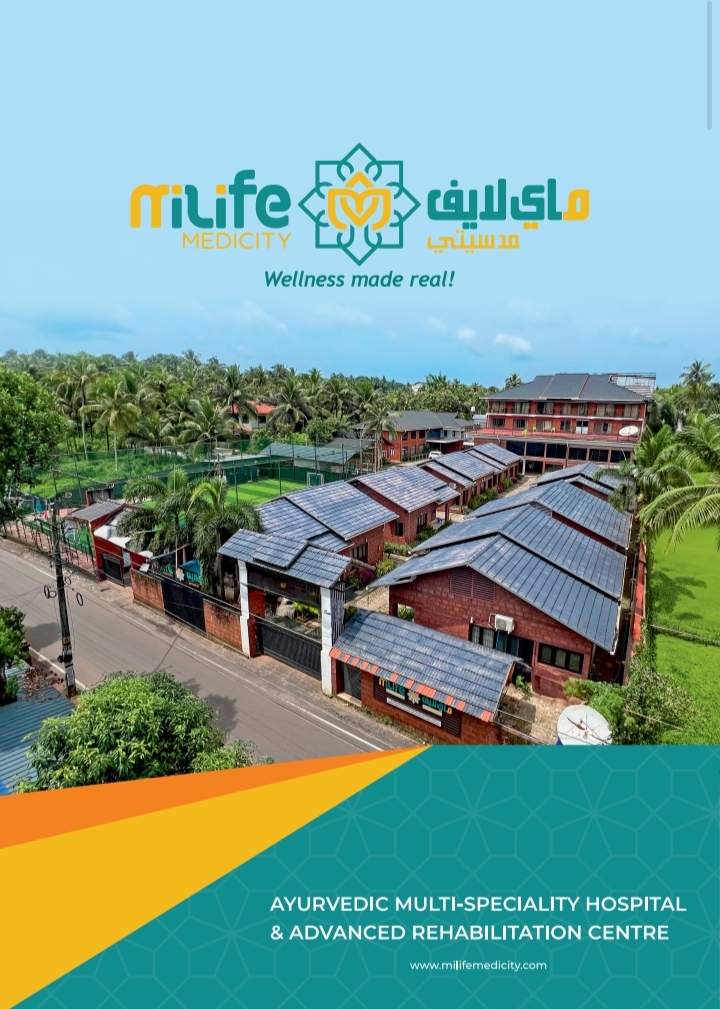Milife Medicity
Kottakkal - Malappuram
Products & Services:
Milife Medicity, Kottakkal, Malappuram, Reviews, Contact number, Phone number, Address, Map, Ayurved More..
Since : 2019
Kottakkal - Malappuram
Products & Services:
Milife Medicity, Kottakkal, Malappuram, Reviews, Contact number, Phone number, Address, Map, Ayurved More..
Since : 2019
Physiotherapy is a critical healthcare service that helps individuals recover from injuries, manage chronic pain, and restore physical mobility. Through a combination of manual therapy, exercise, and education, physiotherapists assist patients in regaining strength, flexibility, and overall well-being. Whether you're recovering from surgery, dealing with sports injuries, or managing conditions like arthritis or back pain, physiotherapy can significantly improve your quality of life.
In Kottakkal, a town renowned for its healthcare services, Physiotherapy Centres have become increasingly important for individuals seeking rehabilitation and physical wellness. These centres are equipped with experienced physiotherapists who provide personalized treatment plans tailored to each patient’s needs. Physiotherapy Centres are specialized healthcare facilities that focus on restoring movement and function in individuals affected by injury, illness, or disability. Physiotherapists, who are healthcare professionals trained in physical rehabilitation, use a variety of techniques to treat musculoskeletal, neurological, and cardiopulmonary conditions. These centres offer a range of services, including pain management, post-operative rehabilitation, sports injury treatment, and mobility training.
· Milife Medicity
Nayadipara Road,
Near Football Turf,
Kottakkal,
Malappuram, 676510
· Arya Vaidya Sala
Main Road,
Kottakkal,
Malappuram, 676503
· Punarjani Ayurvedic Clinic
Near KSRTC Bus Stand,
Kottakkal,
Malappuram, 676503
· Sree Chaitanya Therapy Centre
Edarikode Road,
Kottakkal,
Malappuram, 676503
· Sree Subramanya Therapy Centre
Kizhakkethala,
Kottakkal,
Malappuram, 676503
· Vaidyaratnam Ayurvedic Therapy Centre
Puthur Road,
Kottakkal,
Malappuram, 676503
· Anandam Ayurvedic Centre
Changuvetty,
Kottakkal,
Malappuram, 676503
· Santhigiri Ayurveda & Siddha Vaidyasala
Edarikode,
Kottakkal,
Malappuram, 676501
· Sreepathi Ayurveda Therapy Centre
Athani Road,
Kottakkal,
Malappuram, 676503
· Dhanwanthari Therapy Centre
Perinthalmanna Road,
Kottakkal,
Malappuram, 676503
Physiotherapy, also known as physical therapy, is a healthcare profession that helps individuals recover from injuries, surgeries, and medical conditions through physical exercises, manual therapy, and other rehabilitative techniques. The primary goal of physiotherapy is to restore movement and function, reduce pain, and prevent future injuries. This holistic approach can be applied to a wide range of conditions, including cardiac, post-surgical, musculoskeletal, and neurological issues such as strokes.
In this detailed guide, we will explore various types of physiotherapy rehabilitation programs, including Cardiac Rehabilitation Centers, Post-Surgery Rehabilitation, Musculoskeletal Rehabilitation, and Stroke Rehabilitation. Each rehabilitation program is designed to address specific health challenges and needs, providing patients with tailored care and support.
Cardiac rehabilitation is a specialized form of
physiotherapy aimed at helping individuals recover from heart-related issues
such as heart attacks, heart surgeries, and other cardiovascular conditions.
The program focuses on improving cardiovascular health, strength, and overall
well-being through a combination of exercises, education, and lifestyle
changes.
Key Components of Cardiac Rehabilitation:
Benefits of Cardiac Rehabilitation:
Stroke Rehabilitation
Stroke rehabilitation is a critical part of recovery
for individuals who have experienced a stroke. Physiotherapy plays a vital role
in helping stroke survivors regain physical function, improve mobility, and
enhance their quality of life. The rehabilitation process focuses on restoring
independence and maximizing the patient's ability to perform daily activities.
Key Components of Stroke Rehabilitation:
Post-surgery rehabilitation is a vital part of the
recovery process after any major surgical procedure. Physiotherapy can help
patients regain mobility, reduce pain, and rebuild strength. It is commonly
recommended for patients recovering from orthopedic surgeries (such as knee or
hip replacements), abdominal surgeries, and even cardiac surgeries.
Key Components of Post-Surgery
Rehabilitation:
Musculoskeletal Rehabilitation
Musculoskeletal rehabilitation focuses on treating
injuries and disorders affecting the muscles, bones, joints, and ligaments. It
is often recommended for conditions like arthritis, fractures, sports injuries,
and chronic pain conditions such as lower back pain or neck pain. Physiotherapy
can also address workplace injuries and repetitive strain injuries, helping
patients recover and return to their daily activities.
Key Components of Musculoskeletal
Rehabilitation:
1. What is the role of physiotherapy in
cardiac rehabilitation?
Answer: Physiotherapy plays a critical role in cardiac
rehabilitation by designing safe and effective exercise programs that improve
cardiovascular health. It helps strengthen the heart, improve stamina, and
reduce the risk of future heart problems. A physiotherapist also provides
education on managing risk factors such as diet, exercise, and stress.
2. How soon should I start physiotherapy
after surgery?
Answer: The timing of physiotherapy after surgery
depends on the type of surgery and the patient’s overall condition. In most
cases, rehabilitation can start as early as a few days after surgery, once the
patient is stable. Your doctor or surgeon will recommend the best time to begin
physiotherapy to ensure a smooth recovery.
3. What types of injuries can
musculoskeletal rehabilitation treat?
Answer: Musculoskeletal rehabilitation can treat a
wide range of conditions, including fractures, sprains, strains, dislocations,
arthritis, sports injuries, repetitive strain injuries, and chronic pain
conditions like back pain and neck pain. Physiotherapists use a combination of
manual therapy, exercises, and education to address these issues.
4. How long does stroke rehabilitation
take?
Answer: Stroke rehabilitation varies depending on the
severity of the stroke and the individual's recovery progress. While some
patients may regain significant function within a few months, others may
require ongoing therapy for several years. Early intervention and consistent
physiotherapy can greatly improve the chances of recovery.
5. Can physiotherapy help prevent future
injuries?
Answer: Yes, physiotherapy can help prevent future
injuries by improving strength, flexibility, and balance. Physiotherapists also
educate patients on proper body mechanics, posture, and ergonomic techniques,
reducing the likelihood of re-injury or developing new injuries.

Malappuram, Kottakkal

Malappuram, Kottakkal